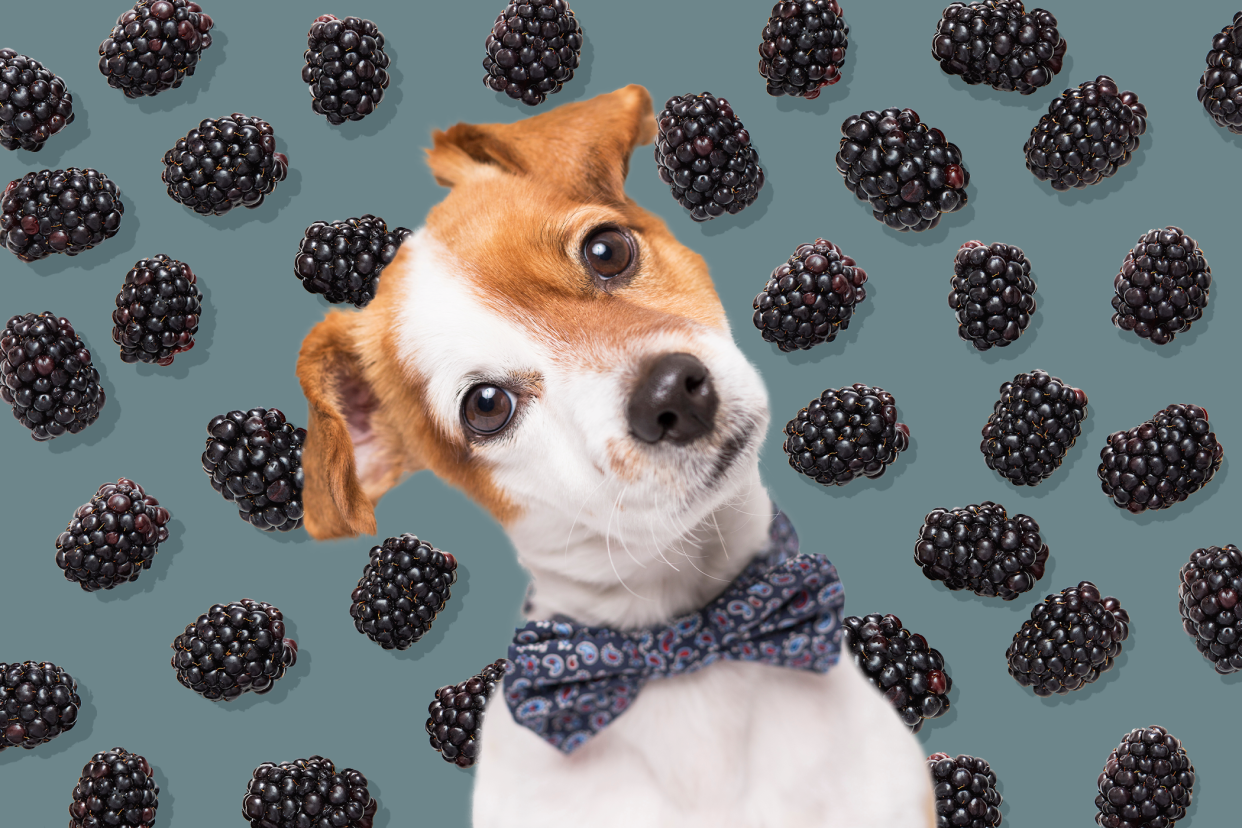Can Dogs Eat Blackberries? Here's What You Should Know About This Tasty Summer Fruit

Winslow Productions / Getty / Eva / Adobe Stock
TABLE OF CONTENTS
On This Page
Are Blackberries Good for Dogs?
How to Safely Feed Blackberries to Your Dog
What Other Berries Can Your Dog Eat?
When you feel a nudge on your elbow or a sniffling snout at your feet, it's hard to resist slipping a few tidbits from your fruit plate to your canine buddy—a good dog deserves all the treats! But can dogs eat blackberries? More importantly, do they even want to? After all, even the sweetest berries can't compare to a succulent morsel of turkey.
Laura Robinson, DVM, is a veterinarian at Antonio Animal Hospital and consulting veterinarian for Canidae Pet Food. She tells Daily Paws that typically, fruits should be used as a snack here and there, as eating too much of them can give your dog diarrhea, vomiting, or an upset stomach.
"The bulk of your dog's diet should still be their regular food—kibble, fresh food, and wet food—balanced using a certain ratio of fats, proteins, and carbohydrates," she says. "Fruit falls into the carbohydrate category, but should only make up a small part of it. Ideally, your pet needs other carbohydrates such as rice or grains. Overall, fruit may make up 1–5 percent of their total diet." Certain dog-safe vegetables fall into the carbohydrates category, too.
Here's a good rule of thumb: Any type of treat besides a dog's regular food shouldn't make up more than 10 percent of their diet. This includes human food they might whimper for as well as their usual doggie nom-noms.
RELATED: Human Foods You Can Safely Share With Your Dog
Are Blackberries Good for Dogs?
Actually, yes! Robinson says blackberries are both safe and good for dogs. "They're loaded with vitamin A, vitamin B, vitamin C, vitamin E, and vitamin K," she says. "They're also very low in sugar and high in fiber, omega 3 fatty acids, and antioxidants."
She adds that combined, these essential nutrients help:
Improve immune system function
Synthesize hormones
Increase energy levels
Decrease inflammation
Your dog can eat blackberries in moderation—Robinson recommends no more than a few daily as part of their treat allotment.
How to Safely Feed Blackberries to Your Dog
To safely feed blackberries to your dog, wash the fruit thoroughly, then let your pupper nibble the berries right out of your hand or as a food topper. Robinson says that some dogs eat frozen blackberries because they like the crunch—this might also be a good way to help your pooch cool down in the summer. (Blackberry pupsicles, anyone?)
"You can even mix them with nonfat plain yogurt or nonfat cottage cheese," she adds. "However, it's important to check that [these products] don't contain xylitol, a type of artificial sugar that's toxic to dogs."
And while your pooch might make a mad scramble for a piece of toast that slips off your plate, it's best if dogs don't eat blackberry jam—there's usually too much sugar in it. This applies to any kind of jam or jelly.
What Other Berries Can Your Dog Eat?
So many! Robinson says dogs can eat raspberries, blackberries, strawberries, and some other fruits, too, as long as you're mindful of keeping these sweet treats under 10 percent of their diet. If your dog has diabetes, consult your veterinarian about other healthy snacks that may be more appropriate for their eating plan.
Here's a handy list of fruits dogs can eat:
Apples, without seeds and skin
Bananas, minus the peel
Blueberries, the raw fruit and not in baked goods
Cherries, unpitted and in small amounts
Cranberries, raw and diced
Cucumbers, without skin and seeds
Mangos, diced and without the pit
Oranges, without the stem, pulp, or seeds
Pineapple, fruit only, no skin or leafy tops
Raspberries, but rarely, as they contain naturally occuring xylitol
Strawberries, but not too much so you can avoid stomach upset
Tangerines, without the skin, seeds, or stem
Watermelon, without the rind and seeds
And to really shake things up, consider vegetables as occasional munchies, too, such as crispy carrots, frozen green beans, and even bits of lettuce or spinach.

